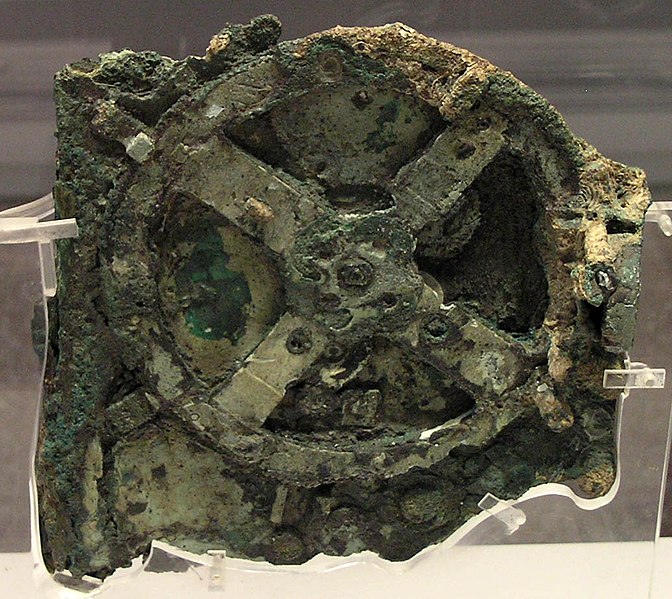 |
| Part of the mechanism in the Athens Museum |
 |
| Reconstruction in Athens Museum |
and it generated complete astronomical information and forecasts: sun, moon, planets, and eclipses, from now until... whenever. A very complex machine. It's assumed the found object was a factory reproduction of an original designed by the great Syracusan mathematician, Archimedes. In the process of discovering all of this information, the historians used all sorts of mystery-solving techniques - questions, x-rays, research, reconstructions, debates, etc. - to try and figure out what that super-corroded device was, what it was for, and how it was made. Fascinating. Catch the reruns, or rent the DVD.
And it explains why so many of us historians are also mystery fans/writers/etc. Because history is all about solving mysteries, very cold case mysteries, with limited evidence, almost no eye-witnesses, and a whole lot of deduction. Yes, a lot of people think that history is nothing but names and dates, but I can assure you that's the least of it - the historical equivalent of a GPS system, keeping you afloat in a vast sea of time. But the real purpose for history is to find out how things got the way they are. History is all about solving the mystery of us.
Of course, some things never change: human nature (curiosity, greed, anger, pride, love, lust, all the emotions and desires), and what comes of that human nature (the pursuit of power, pleasure, wealth, appetite, and occasionally peace).
 |
| Frontisepiece to Rousseau's "Emile" |
And some things change all the time, especially fashion and beauty, which are simply exercises in the verb "to change".
Where does technology fit into this? Well, I couldn't help noticing that, even on Nova, the scientists were constantly amazed at the complexity of the Antikythera Mechanism, and the ingenuity of the ancients. And this is a classic example of one of the two great biases that historians face, within themselves and within their students/readers/society:
- WAR: Greek fire; gunpowder; Archimedes and his war machines (first laser prototype; the Archimedes Claw).
- TIMEKEEPING and ASTRONOMY: Chinese paper and compasses, originally used for timekeeping, astronomical observations, divination, and prayers; the Antikythera Mechanism, used for timekeeping and astronomy; water clocks, mechanical clocks, etc.
- ENTERTAINMENT: Look no further than the Roman Colosseum, which used a huge amount of technology of all kinds to present battles on land and sea.
- PUBLIC HEALTH: Flush toilets and sanitary systems of the Indus Valley (Harappa, 26th c. BCE), Knossos (18th c. BCE) and other ancient civilizations; public baths (Indus Valley, Greece, Rome,Ottomans, Japanese).
- NOTE: I'm well aware that time only moves in one direction (at least in this brane), but it's far more like a tree, with multiple branches and twigs and stems and leaves, than an arrow. There have been societies and civilizations that have vanished completely off of the face of the earth. There are echoes everywhere of things and people that were, but left no trace. And even if they leave a trace, no explanation. Not everything connects. History is full of red herrings.
- NOTE: Just to show how dangerous this bias can be, a classic work of nostalgia history is Plutarch's (ca. 46-120 CE) "On Sparta", in which that violent, anti-education military slave state is presented as the ideal civilization, strong, brave, and free from the corruptions of commerce and money. Obviously, Plutarch had an axe to grind. But very few people even think about that. Because he himself is an "ancient writer" a lot of people swallow everything he wrote as if it were absolute truth, not paying attention to the fact that he wrote almost 500 YEARS AFTER SPARTA'S DEMISE. That's the kind of thing you have to look out for. And part of the reason yes, you do have to know your dates...

